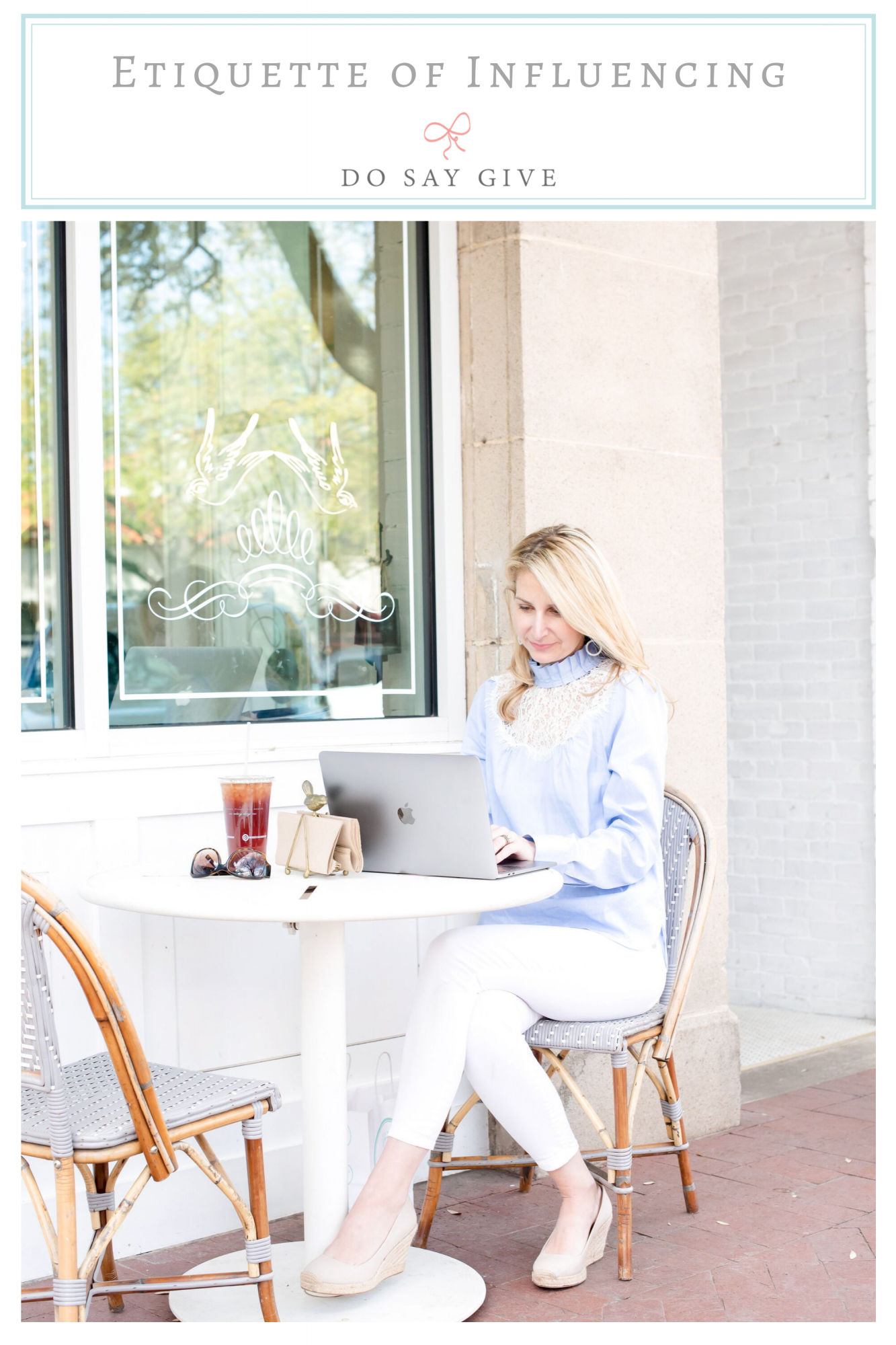The world of blogs and social media seems commonplace now, but it is still quite new in the grand scheme of things. And the matter of the etiquette of influencing remains relatively untouched. So I’m is weighing in on the matter today. Even if you’re not an influencer or brand, these 10 tips might help you understand how the influencer world works and how DoSayGive is trying to make it more transparent – and gracious!
As I say often when talking about etiquette, we are all a work in progress. (I know I am!) So wherever you are in your influencer or business journey, I hope these tips encourage you to always take the gracious route.
1. Don’t ask followers to use your affiliate links.
These days most people following influencers understand you make a commission from some of the products you feature. So constantly pleading with your followers to do so hints at desperation and, yes, even greed. Think about it: the sales person at Neiman Marcus would never be so blunt to a valued customer about commission details (as much as he or she wants it!). Cultivating a loyal and authentic following, and providing excellent content or services that draw people to your site, will pay off in the long run. No nagging required:).
2. Don’t ask people to turn on post notifications, like your posts, or engage with your posts, etc.
Doing this often has the exact opposite effect that influencers and creatives are seeking. (See point #1) In the real world, people don’t like to befriend desperate and insecure people. It’s the same with the influencer world. No matter how frustrating the notorious Instagram algorithm can be, projecting confidence and producing truly engaging content will get you the same (or even better!) result in the long run.
3. Be gracious in everything, even in the aspects of the business that aren’t so fun.
For example, overflowing DMs is a sign of a successful and engaging influencer. It is ok to apologize for not responding to every message, despite our best efforts or directing people to email. But complaining about too many messages (or anything about your fabulous job that many envy!) can come across as ungrateful.
More tips on this matter: A quick thank you note goes a long way after someone collaborates with you. Also try to reciprocate or acknowledge when someone gives you a lot of social media love.
4. Tag companies that gift you products.
Influencers are gifted many items. Don’t get too big for your britches and “forget” to tag them if you post a photo with the item. Particularly for small or new brands, gifting product is a big deal and this is a small way of saying thank you!
5. Ask before posting photo or tag “private” people (or their children) in a photo.
Not everyone is comfortable being in front of big crowds. Even online ones.
6. Respond to every serious inquiry.
Someone once said that you can easily judge the character of a man by how he treats those who can do nothing for him. It was an 18th century German writer (Van Goethe) who said this but his message is relevant even to modern digital creatives. It might be tempting to ignore a potential partner off because you assume they wouldn’t be a good fit or don’t have a budget, but any one who takes the time to draft an email (not talking mass emails) is worthy of a reply. Treat people how you want to be treated! Yes, it’s hard to say no, but saying no is so much better than the cold shoulder.
7. Credit your photographer.
Photographers are growing a business, too, and your photos are their craft. Doing your best to give credit where credit is due can have a huge impact on their business. Preferably in the caption.
8. Disclose all sponsored content.
Vogue magazine or The Today Show never apologize for their sponsored content, so why should you feel bad about it? Sponsored content is a sign of a thriving business and allows you to be able to grow. (DoSayGive is a team of four – we could not offer our fabulous holiday gift guide, book club, etc. without sponsors!)
In other words, if you want this influencer gig to be a business, then you must treat it like one. And in the influencer world, transparency is key. When people discover an influencer isn’t up front about sponsored content, they start to lose their trust and that is NOT a good thing in the influencer world.
9. Never say, “This is not sponsored.”
This is often said with good intentions, but can actually be a kiss of death in the influencer world. Flippantly saying “This is not sponsored” after offering a glowing review of a product or brand immediately strips you of credibility as an influencer. It’s as if you weren’t really sincere about the sponsored products you have featured.
It’s also an insult to the sponsors who have made an investment to promote their products in an authentic way. Bottom line: if you are partnering with sponsors who truly align with your brand you will never have an issue with credibility. If it weren’t for the FTC requirement to disclose sponsored content, your followers should not see much difference between the sponsored and non sponsored content.
10. Be Transparent About Your Following
On the subject of transparency and credibility, influencers should always seek to maintain complete honesty about their followings. Why is this an etiquette issue? Because it affects all other influencers.
If you use comment or like pods, follow or unfollow methods, or loop giveaways to generate followers or engagement, out of transparency you should disclose this to your sponsors and potential sponsors. Although DoSayGive does not use these methods, I am not making a judgement call on them as I understand they are often done with good intentions (to beat the Instagram algorithm and get your content seen).
But think about it: if a company thinks they are investing in an influencer who has high engagement because she tells them she gets an average of 30 comments on a post, but 29 of those comments are from fellow bloggers in a comment pod with whom she has a mutual agreement, then that isn’t authentic engagement. Companies who work with influencers that have these inflated numbers often get burned (i.e. they don’t get an ROI) and dismiss influencer marketing altogether. When, in fact, there are lots of influencers who have loyal, engaged – and authentic – audiences who could serve their brand tremendously.
Any etiquette tips you would add? Influencer or not, I would love to hear your thoughts on the topic!
And stay tuned for the flip side of this conversation: the etiquette of working with influencers! Sign up here to receive our emails so you don’t miss that one!
Photo: Audrie Dollins





What do you think?